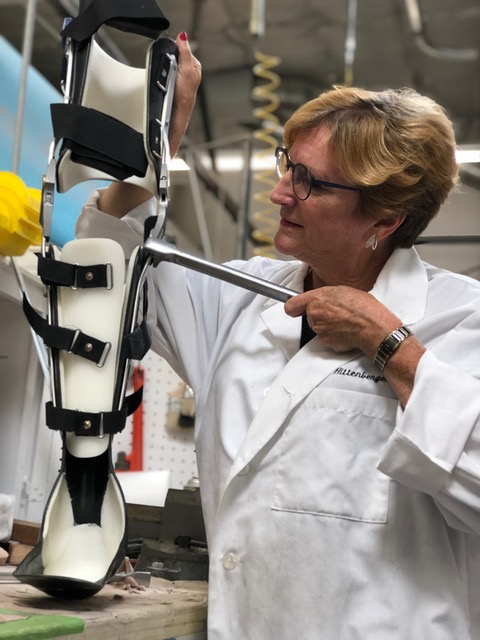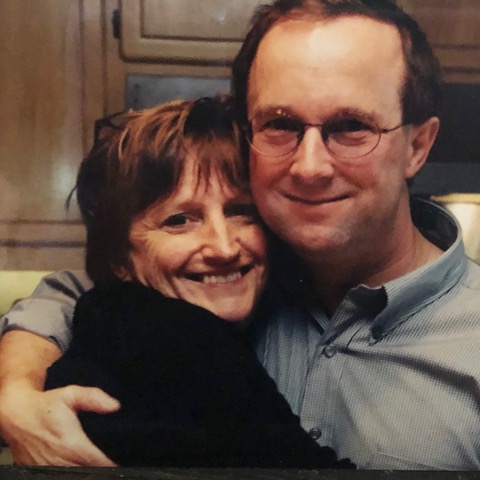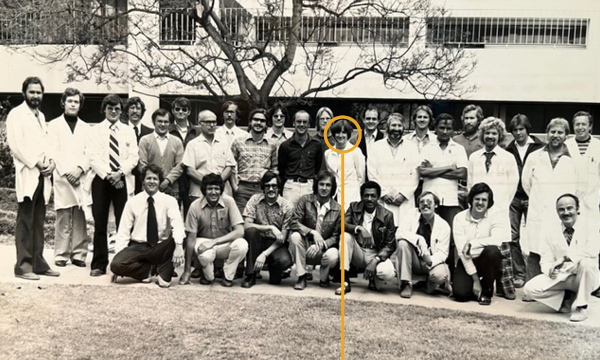Fourth-Generation Orthotist Supports Scholars

This story was published in the March 2024 issue of The Philanthropist, a newsletter for supporters and friends of Northwestern University Feinberg School of Medicine. Read past issues here.
As a child, Tina Hittenberger, CO(E), spent many a summer evening with her family enjoying picnics in the C.H. Hittenberger Company prosthetics factory in San Francisco. Their father, Herman Carl, often joked that they were eating “baloney—not ‘below knee’—sandwiches.”
Herman Carl Hittenberger represented the third generation of Hittenbergers to work in the prosthetics and orthotics profession. When Tina and her brother, Drew, were born, it seemed fate that they would enter the profession, too.
“From the beginning, and almost every day thereafter, it was woven into the fabric of who we were,” Ms. Hittenberger said.
Sure enough, Tina and Drew went on to enroll in Northwestern’s intensive courses to prepare students for a successful career and to pass the rigorous American Board for Certification (ABC) exam. In 1975, after taking courses at Northwestern, Tina Hittenberger became one of the first women to become certified in orthotics.
When the siblings were looking for ways to honor the family legacy and continue to support the next generation of practitioners, they remembered their experiences at Northwestern. In November 2023, Ms. Hittenberger made an initial $100,000 lead gift to establish the Hittenberger Legacy Fund Scholarship to support the Northwestern University Prosthetics-Orthotics Center (NUPOC). The first scholarship will be awarded in the 2024-25 school year.
“We are extremely grateful that Tina has chosen to support our center through her generous philanthropy,” said Elliot Roth, MD, the Paul B. Magnuson Professor of Rehabilitation Medicine and chair of the Department of Physical Medicine and Rehabilitation. “The field of orthotics and prosthetics needs bright, determined, and well-trained practitioners to help persons with disabilities, injuries, and other functional needs to thrive.”
Ms. Hittenberger said that, in addition to generating awareness of the growing number of women in the profession, she hopes the scholarship will help encourage others to support a new generation of practitioners.
A Family Calling

The C.H. Hittenberger Company was established in 1902 by Ms. Hittenberger’s grandfather, Carl Herman Hittenberger. His father, her great-grandfather, Herman Carl Hittenberger, was an immigrant who left Germany to begin a new life in the American West making saddles and trusses. He valued practical applications and innovation, so he sent his son back to Germany to acquire skills and learn a new trade: making custom devices to improve people’s lives.
Upon Carl Herman’s return to the United States, he perfected his techniques in Philadelphia then moved to California, where he and his new wife, Marie, established a business manufacturing modern prosthetics and orthotics. From their home, Marie sewed corsets, jackets tailored for polio patients, and spinal supports. Carl Herman Hittenberger became a pioneer in the field, inventing the first lightweight prosthesis from thin sheets of laminated wood, working closely with Veterans Affairs to provide contracted services to veterans, designing devices and setting up clinics for polio patients, and co-founding the American Orthotic and Prosthetic Association (AOPA).
Their son, who inherited his grandfather’s name, Herman Carl Hittenberger, contributed significantly to the field of rehabilitation medicine at the University of California, Berkeley and established many prosthetic and orthotic programs in universities in the US. As a respected practitioner, he worked closely with surgeons, hospitals, and the ABC to set standards and trained and certified many of today’s leading prosthetists and orthotists. His sister, Martha, was also an active participant in the company.
After majoring in sculpture in college, Tina pivoted back to prosthetics and orthotics while the C.H. Hittenberger Company transitioned to Hittenbergers Orthotic and Prosthetic Services and expanded to 15 patient care centers in California.

Ms. Hittenberger was one of only a few women pursuing a career in orthotics in the 1970s.
“It was all men,” she said. “There was a kind of locker room vocabulary, bad jokes, pranks, and a definite ‘attitude,’ but I did learn to hold my own.”
Drew graduated, too, completing his clinical work at Rancho Los Amigos Hospital in Los Angeles. After receiving his CP certification, he was a lead researcher at Prosthetics Research Study in Seattle. He invented the Seattle Foot and received the U.S. Presidential Award for Design in 1985.
In her early years as an orthotist, Ms. Hittenberger worked with many post-polio, lower extremity, spinal injury, and patients with breast cancer. In the late 1970s, she obtained her pilot’s license, which she put to use as a member of Los Médicos Voladores, or The Flying Doctors, providing orthotics to patients in Sonora, Mexico. Later, in the early 2000s, she worked in Da Nang and Hanoi to set up clinics to help rehabilitate victims of land mines in Vietnam. After the war in Afghanistan, Drew and his father were part of the first international exchange of prosthetic technology and psychological services with Russian and American veterans.
Ms. Hittenberger served as an examiner for the ABC, chair of the Scientific Program for AOPA, presented scientific papers at regional, national, and international conferences, worked on the facility accreditation team, and was an editorial reviewer for the Journal of Prosthetics and Orthotics.
Each member of the Hittenberger family found their careers to be personally fulfilling and knew that, together, they had an impact on patients and practitioners around the world, Ms. Hittenberger said.
In July 2023, nearly 50 years after attending classes, Ms. Hittenberger visited NUPOC. She met with Dr. Roth, Steven A. Gard, PhD, director of NUPOC and an associate professor of Physical Medicine and Rehabilitation and McCormick School of Engineering, and other faculty members in the center.
“It was phenomenal,” Ms. Hittenberger said of NUPOC. “It is so state of the art and clearly has a vision for the future. The instructors are clearly masters of their craft, and the students are passionate.”
NUPOC is the largest and oldest accredited prosthetics and orthotics training institution in this hemisphere and consistently publishes research that is responsive to today’s advances in science, technology, and healthcare. No institution in the world has contributed more national leaders, more internationally recognized experts, more ABC-certified practitioners, or more new, clinically relevant knowledge to the field.
Dr. Roth said it was an honor to host such an accomplished graduate from the program.
"During her visit, Tina impressed our faculty and leadership with her personable nature, inquisitiveness, and commitment to the successful future of the orthotics and prosthetics profession,” he said. “Her generosity of spirit was matched by her genuine interest in the well-being of the students and her commitment to excellence in orthotics and prosthetics education.”
For more information about supporting the Northwestern University Prosthetics-Orthotics Center (NUPOC), please contact Mary Kreller at mary.kreller@northwestern.edu or 312-503-0742.